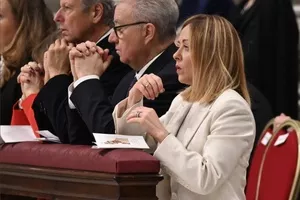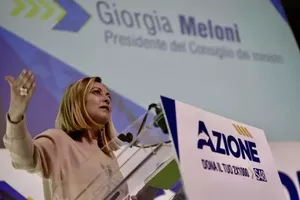An impressive line-up of events included a ceremony at Casa Manzoni, the writer’s home from 1814 until his death in 1873, in the presence of President of the Republic Sergio Mattarella, and a performance in the cathedral of Giuseppe Verdi’s Requiem, composed for the first anniversary of Manzoni’s death in 1874.
“Today, the figure of Alessandro Manzoni stands out as one of the most relevant personalities in the entire history of our city and our country,” Milan Mayor Giuseppe Sala said in his daily podcast Buongiorno Milano dedicated to the writer.
“He is not an easy character, certainly. But neither is he that dusty figure, far removed from life, that has been delivered to public opinion and, above all, to younger people by a certain Italian academic and editorial tradition,” he continued.
Sala described Manzoni as “a true Milanese of Europe, a writer who from Piazza Belgioioso exerted a fascination and an interest through his works and thought that is difficult to imitate in the history of our country”.
Speaking about Manzoni’s influence, Mattarella said persons, not ethnic groups, need protection
He recalled that in Manzoni’s eyes, “it is the person, insofar as they are children of God, and not the race, the ethnic group or the national community, that must be the beneficiary of universal rights, of safeguards and protections”.
“It is man, per se, not only as a member of a nation, but insofar as he is a citizen, who is the bearer of dignity and rights,” Mattarella said.
He also stressed other parts of Manzoni’s philosophy, saying that the great writer had not reneged on the values of the French revolution.
He also stressed that the Italian Constitution “prohibits pernicious ideas of the supremacy of the race”, that politicians should build policy instead of looking at opinion polls; and that power should not try to please anonymous crowds.
The president also said that Manzoni, the father of modern Italian literature, wanted a united Italy and not statelets.
“Reconnecting with the great tradition of civil poetry, of Dante, Petrarch and Foscolo, he aspired to a united Italy, which would not be a mere geographical expression, a cold addition of different states and statelets, but the lofty synthesis of a single people, strong and proud of its culture, history, language and roots,” the president said.
“To the (French) poet (and foreign minister Alphonse de) Lamartine, who had spoken contemptuously of the ‘diversity’ of Italian ‘peoples’, Manzoni replied in an indignant letter: ‘No, there is no longer any difference between the man of the Alps and the man of Palermo’,” Mattarella stressed.
ANSA



























